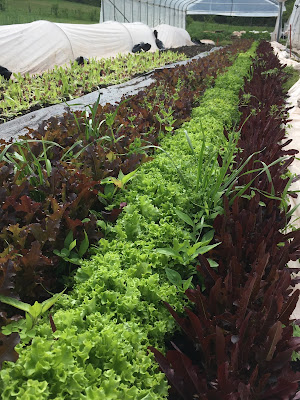The Role of Food in (my) Post-Pandemic Life
december 21, 2020
Chapter 1
"What's happening is the collapse of the web of life: biological diversity, wildlife populations, wild ecologies. We're in the midst of a mass-extinction event...and in addition to outright extinction, there are wholesale eliminations of local populations of plants and animals." - sociologist Eileen Crist, interviewed in the Sun Magazine, Dec 2020, issue 540
"Whether by ecological breakdown or concerted action, the era of mass production and consumption is nearing its end. This means that the resource-intensive systems of provisioning on which many currently depend upon to meet their daily needs will change...Food systems, in all their many forms and complex interaction, are already showing signs of failure." - opening to the objectives of the international symposium, “Transitioning Cultures of Everyday Food Consumption and Production: Stories from a Post-growth Future,” to be held January 13th-16th, 2021
~~~
We're at a critical point in our history, and food promises to be a central issue around which we will have to work, motivate, and mobilize. I've always been interested in food. I was told stories by my mother about how, as a young boy, I would ask to sit on the kitchen counter and "help" her prepare meals. In my late teens, my discovery of questionable practices in the industrial meat supply led me to become vegetarian. Through my 20s I went on to work in kitchens and bakeries before returning to school. For my Master's work in Applied Anthropology, I examined how Maya communities in southern Belize grow food, both traditionally, and in newly introduced school gardens. For my doctorate, my research expanded on that work in Belize to look at health more generally, and food and diet was always high on the list of how many people maintained their health.
More recently, instead of pursuing a career in academia after my completing my PhD, I founded, consulted on, then ran a brewpub project guided by my anthropological expertise. I sought to develop a different model for commercial kitchens by placing them directly within the community food chain. The kitchen sourced everything on the micro-local scale from dozens of small, independent family producers. For eight months of the year, the kitchen sourced all of its food from about a 15 mile radius. In the four months of winter, that radius was expanded to about 40 miles. Relationships grew and blossomed, and patrons not only got to know where the food they were eating was from, they got to know the people who grew and made. it. Community developed. Much food was enjoyed. It was a working model until the pandemic hit, and eventually forced the kitchen to close.
This short history is offered to briefly situate myself and my writings. If there has been one common thread throughout my life, it has probably been food. My most recent work on the brewpub would probably still be all-consuming if not for the pandemic. I was aspiring to develop a cohesive local food system, and in today's capitalist-defined world, doing so through a business felt like a necessary part of the work. Still, the drive to "make more money" by other parties involved in the project presented an internal conflict. The goal of the project was to provide a unique and fulfilling experience for the consumer, with a staff that was compensated at well above industry standards, following a horizontal management/work environment, and supporting a fairly large number of local food producers. Noticeably absent in that model was the maximizing of profit. Instead, the focus was on quality of life and community. But this is a story for another time.
At this point, with a few months separating me from that work on the brewpub, I'm returning a bit to my anthropological roots by writing and developing new research. One of the tenets of anthropology is that we share our work and scientifically driven insights, not only academically, but also with the general public and with our communities. I will continue to work with this life-long thread, a renewed focus on food and its role in our hopefully soon-to-be post-pandemic lives. The pandemic of 2020 has certainly altered life on the planet in many ways. For many, the changes feel personal, and rightfully so, as our individual lives have largely been turned upside down. However, it's likely that the changes will be a bit more wide-spread, and a return to "normal" may not be fully possible. I would argue that it's also not desirable, and that we should consider, as humans, working for change instead of letting change continue to happen to us.
I believe that working on issues related to food offers a path forward for us as individuals and as a society. I hope that my work will shed some light on that path. I aim to write in more depth about my work with the brewpub as a model for building resilience in a local food system. I am also developing a new project driven by the concept of foraging, both as practice and as metaphor. I will share bits and pieces of that project as it develops and takes shape. I will continue to examine issues centered around food and society, and find a voice through my writing. In closing, please consider that there is a crisis upon us. The climate is changing, and that will affect our food system in profound ways. Some people are beginning to think about that. You should too. I am. Please check in here sometimes, and be sure to share your thoughts.
Now go feed yourself!

Comments